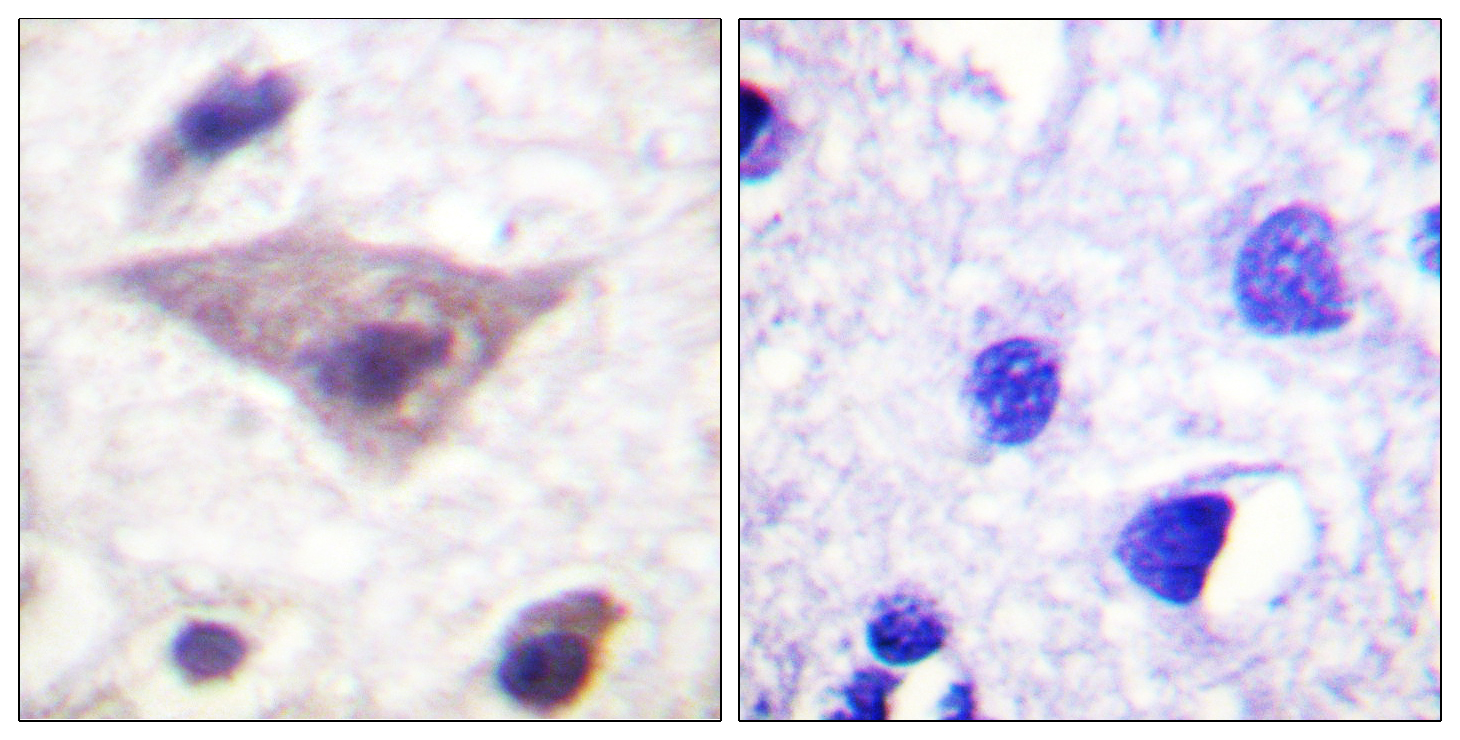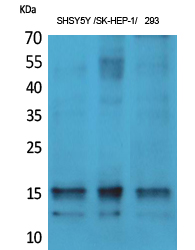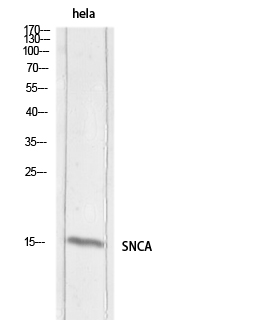Synuclein-α (phospho Ser129) Polyclonal Antibody
- 货号:YP0258
- 应用:WB;IHC;IF;ELISA
- 种属:Human;Mouse;Rat
- 靶点:
- Synuclein-α
- 简介:
- >>Alzheimer disease;>>Parkinson disease;>>Pathways of neurodegeneration - multiple diseases
- 基因名称:
- SNCA
- 蛋白名称:
- Alpha-synuclein
- Human Gene Id:
- 6622
- Human Swiss Prot No:
- P37840
- Mouse Gene Id:
- 20617
- Mouse Swiss Prot No:
- O55042
- Rat Gene Id:
- 29219
- Rat Swiss Prot No:
- P37377
- 免疫原:
- The antiserum was produced against synthesized peptide derived from human Synuclein around the phosphorylation site of Ser129. AA range:91-140
- 特异性:
- Phospho-Synuclein-α (S129) Polyclonal Antibody detects endogenous levels of Synuclein-α protein only when phosphorylated at S129.
- 组成:
- Liquid in PBS containing 50% glycerol, 0.5% BSA and 0.02% sodium azide.
- 来源:
- Polyclonal, Rabbit,IgG
- 稀释:
- WB 1:500 - 1:2000. IHC 1:100 - 1:300. ELISA: 1:5000.. IF 1:50-200
- 纯化工艺:
- The antibody was affinity-purified from rabbit antiserum by affinity-chromatography using epitope-specific immunogen.
- 浓度:
- 1 mg/ml
- 储存:
- -15°C to -25°C/1 year(Do not lower than -25°C)
- 其他名称:
- SNCA;NACP;PARK1;Alpha-synuclein;Non-A beta component of AD amyloid;Non-A4 component of amyloid precursor;NACP
- 实测条带:
- 15kD
- 背景:
- Alpha-synuclein is a member of the synuclein family, which also includes beta- and gamma-synuclein. Synucleins are abundantly expressed in the brain and alpha- and beta-synuclein inhibit phospholipase D2 selectively. SNCA may serve to integrate presynaptic signaling and membrane trafficking. Defects in SNCA have been implicated in the pathogenesis of Parkinson disease. SNCA peptides are a major component of amyloid plaques in the brains of patients with Alzheimer's disease. Alternatively spliced transcripts encoding different isoforms have been identified for this gene. [provided by RefSeq, Feb 2016],
- 功能:
- alternative products:Additional isoforms seem to exist,disease:Brain iron accumulation type 1 (NBIA1, also called Hallervorden-Spatz syndrome), a rare neuroaxonal dystrophy, is histologically characterized by axonal spheroids, iron deposition, Lewy body (LB)-like intraneuronal inclusions, glial inclusions and neurofibrillary tangles. SNCA is found in LB-like inclusions, glial inclusions and spheroids.,disease:Defects in SNCA are a cause of autosomal dominant Parkinson disease 1 (PARK1) [MIM:168601, 168600]. Parkinson disease (PD) is a complex, multifactorial disorder that typically manifests after the age of 50 years, although early-onset cases (before 50 years) are known. PD generally arises as a sporadic condition but is occasionally inherited as a simple mendelian trait. Although sporadic and familial PD are very similar, inherited forms of the disease usually begin at earlier ages an
- 细胞定位:
- Cytoplasm . Membrane . Nucleus . Cell junction, synapse . Secreted . Cell projection, axon . Membrane-bound in dopaminergic neurons (PubMed:15282274). Expressed and colocalized with SEPTIN4 in dopaminergic axon terminals, especially at the varicosities (By similarity). .
- 组织表达:
- Highly expressed in presynaptic terminals in the central nervous system. Expressed principally in brain.
Resveratrol Inhibits VDAC1-Mediated Mitochondrial Dysfunction to Mitigate Pathological Progression in Parkinson’s Disease Model MOLECULAR NEUROBIOLOGY Feng Shenglan IHC,IF,WB Mouse brain tissue MN9D cell
货号:YP0258
- June 19-2018
- WESTERN IMMUNOBLOTTING PROTOCOL
- June 19-2018
- IMMUNOHISTOCHEMISTRY-PARAFFIN PROTOCOL
- June 19-2018
- IMMUNOFLUORESCENCE PROTOCOL
- September 08-2020
- FLOW-CYTOMEYRT-PROTOCOL
- May 20-2022
- Cell-Based ELISA│解您多样本WB检测之困扰
- July 13-2018
- CELL-BASED-ELISA-PROTOCOL-FOR-ACETYL-PROTEIN
- July 13-2018
- CELL-BASED-ELISA-PROTOCOL-FOR-PHOSPHO-PROTEIN
- July 13-2018
- Antibody-FAQs
- 产品图片

- Immunohistochemistry analysis of paraffin-embedded human brain, using Synuclein (Phospho-Ser129) Antibody. The picture on the right is blocked with the phospho peptide.

- Western blot analysis of lysates from mouse brain, using Synuclein (Phospho-Ser129) Antibody. The lane on the right is blocked with the phospho peptide.


